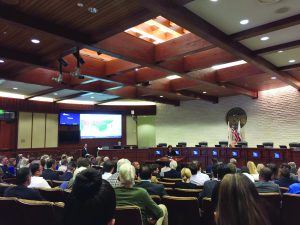Cities Hesitant to be Labeled ‘Sanctuaries’
In light of proposals to have California become a “sanctuary” state, and with Bill SB54 moving forward, political leaders in cities such as National City and Chula Vista are hesitant to follow suit, since they feel that the term has been politicized to the extent that it would no longer be helpful to the immigrant community nor give peace of mind to people in general.
“We have to protect peoples’ rights. If we label ourselves, particularly as a ‘sanctuary’, I think it gives people false hope. It makes them think no one can touch them, and it’s purely ceremonial. So, I think that we need to be careful with such titles that can give people false hope, and make sure we are providing accurate information,” said National City Mayor Ron Morrison.
Chula Vista has taken a similar stance, rejecting a proposal to become a sanctuary city and deciding instead to vote on April 25th to become a “Welcoming City”, thus continuing with its traditional policies to provide support to immigrants and refugees.
“The term ‘sanctuary’ has been distorted, politicized, and it creates tension. The reason for this is that people who are anti-immigrant have adopted the label to say ‘you are harboring criminals’, and that is just not true. On the other hand, being called a sanctuary city also gives immigrants a false sense of security, like they are untouchable by agencies such as ICE, and that is also not true. ICE still has the authority to come in and do raids and the like, but they will not have the cooperation of the City of Chula Vista and the Police Department for that,” shared Chula Vista Mayor Mary Salas.
The fact is that – despite California’s efforts to become a sanctuary, the organizing of workshops throughout the state to educate people on their rights, and cities coming up with new names to indicate they would aid undocumented aliens – policies such as ICE’s Expedited Removal program, which lets officials bypass due process protections in deporting people arrested within 100 miles of the border, are still in full swing.
“Within these 100 miles, they can basically take peoples’ rights away. An officer could, without probable cause or reasonable suspicion, automatically stop someone, pull them over for any reason, and there is a serious problem with that,” added Ron Morrison.
With all this uncertainty, authorities and immigration attorneys are advising immigrants to be better informed than ever, to know all their rights and the specifics of their situation so they are not taken by surprise by officers and become part of the family separation statistic in the U.S.





